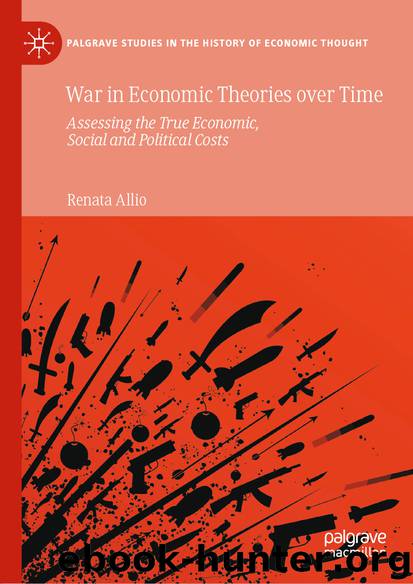War in Economic Theories over Time by Renata Allio

Author:Renata Allio
Language: eng
Format: epub
ISBN: 9783030396176
Publisher: Springer International Publishing
War as a Game
Students of military strategy and theoretical economists in the mid-twentieth century began to adopt common tools to analyse the choices made in their respective disciplines and dictated, both in the case of war and in the case of economic competition , by a conflict of interests. The theory used since then for this analysis, Game theory , tried to establish how individuals should behave “under conditions of uncertainty, when such uncertainly derives from decisions unknown to the other individuals interested - generally being opposed to each other - in the outcome of the ‘game’”. The game could be a war (hot or cold), economic competition or a competition between cunning people (de Finetti 1963, 1, p. 61).
Clearly, this was not the first time that economic choices had been developed through the application of mathematics. It had already been the case with Laplace and his calculation of probability, which could also be used in the study of gambling. Economic theory had thus posed the problem of the rational behaviour of the economic subject and had identified it in the decision that allowed for the maximization of utility /gain with the least effort/investment required. Cournot had applied the principle to the case of monopoly. Later, Walras too had identified a model of general equilibrium , in which, nevertheless, as Morgenstern wrote (1960, p. 125), “every economic subject acts as an individual Robinson Crusoe who is not conscious of his own influence on others and upon whom no influence is brought to bear by others”.
At the end of the nineteenth century, Francis Ysidro Edgeworth, an English mathematician and marginalist economist , a contemporary of Jevons and Marshall, proposed the application of mathematical techniques to moral sciences, in particular in order to study individual decisions in conflictual economic situations. In that period, economics tended to analyse the consequences deriving from choices made by agents operating on the market. Edgeworth considered that the rules and calculations that were valid in private exchange could be extended beyond the market sphere to the political struggle for power and trade disputes over wealth too, thereby opening the way for the economic formalization of combat (cfr. Schmidt 1991, p. 69).2
The book Mathematical Psychics, published in 1881, was not originally intended as an economic tract, but rather as an essay aimed at testing the possibility of applying mathematical methods to sociology through the calculation “of sentiments” in a utilitarian spirit (Edgeworth 1967 [1881], p. IX). In his book, Edgeworth distinguished economic calculation, which analysed equilibrium in a system of hedonistic forces where each person tended to realize the maximum individual utility , from a utilitarian calculation, which studied the equilibrium of a system in which each person tended to realize the maximum general utility and which, despite the apparently unrealistic character, was held to be superior.
Edgeworth inquired into the relationships between wars and economic competition and defined “war” in a general sense of any action undertaken without (or against) the consent of those who suffered the consequences
Download
This site does not store any files on its server. We only index and link to content provided by other sites. Please contact the content providers to delete copyright contents if any and email us, we'll remove relevant links or contents immediately.
Pale Blue Dot by Carl Sagan(4992)
The Rules Do Not Apply by Ariel Levy(4950)
Goodbye Paradise(3795)
Ogilvy on Advertising by David Ogilvy(3591)
Liar's Poker by Michael Lewis(3436)
Delivering Happiness by Tony Hsieh(3410)
Into Thin Air by Jon Krakauer(3381)
Purple Cow by Seth Godin(3188)
Rogue Trader by Leeson Nick(3039)
The Social Psychology of Inequality by Unknown(3013)
The Airbnb Story by Leigh Gallagher(2835)
4 - Harry Potter and the Goblet of Fire by J.K. Rowling(2694)
The Mind Map Book by Tony Buzan(2565)
Bossypants by Tina Fey(2514)
Claridge's: The Cookbook by Nail Martyn & Erickson Meredith(2397)
All the President's Men by Carl Bernstein & Bob Woodward(2361)
Six Billion Shoppers by Porter Erisman(2292)
Master of the Game by Sidney Sheldon(2277)
Alibaba by Duncan Clark(2074)
